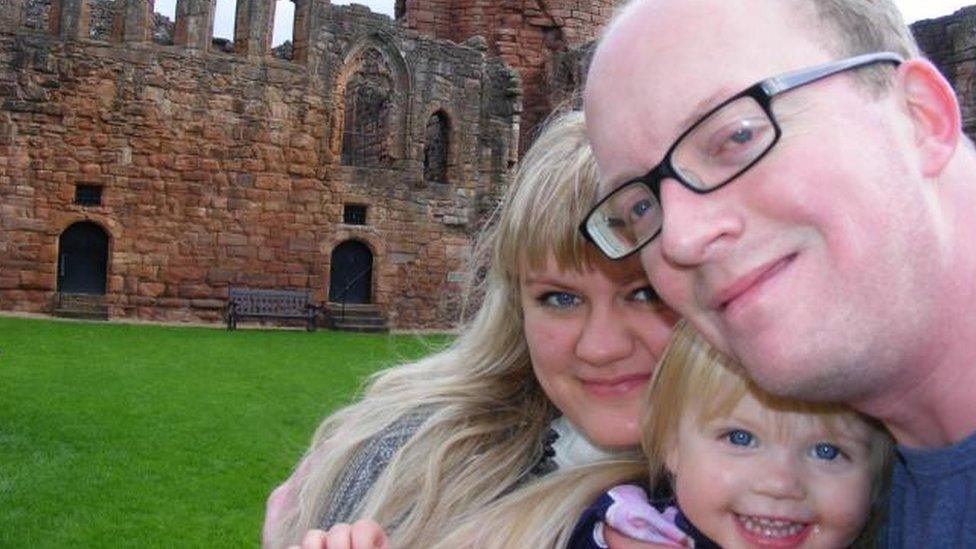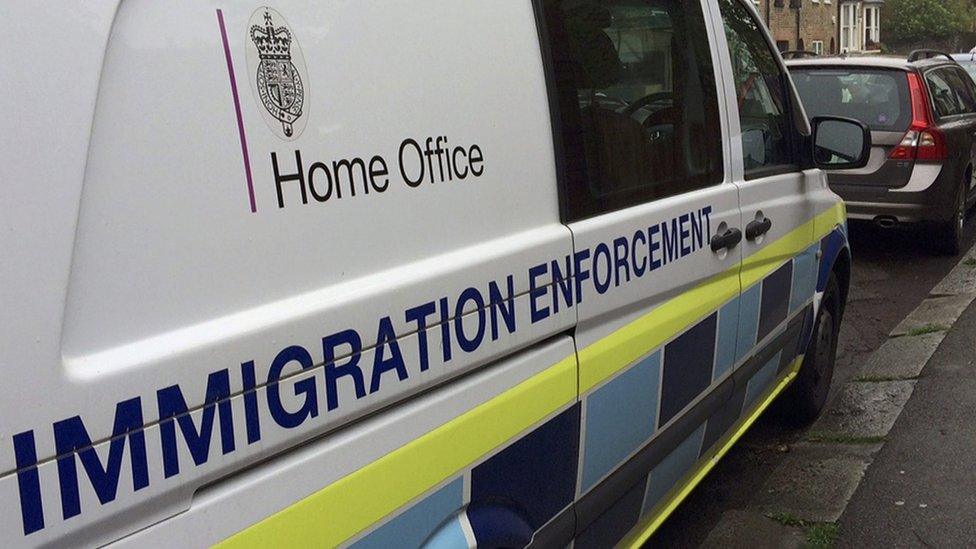Deportation case against Coatbridge mother halted
- Published

Derek and Olya Merry married in Belarus in 2013 and have been fighting for UK residency
A Coatbridge mother who had been facing deportation from Scotland has had the immediate threat of expulsion lifted.
Olya Merry was told that she could be deported back to Belarus if she does not leave the UK this week.
Politicians including local MPs and MSPs took up the case, with the Scottish government writing to the home secretary urging a rethink.
It has now been confirmed that a review of the case will be carried out, with no deportation in the meantime.
Mrs Merry's husband Derek told BBC Scotland that they "couldn't be more delighted" with the news.
The couple married in Belarus in 2013, and have been struggling to win permission for Mrs Merry to reside in the UK ever since.
As Belarus is not in the European Economic Area, the couple first moved to Ireland to establish themselves as EEA residents, which would have provided a route for Mrs Merry to be entitled to a UK residence card.
They stayed there for six months before relocating to Lanarkshire when Mrs Merry became pregnant. She gave birth to daughter Milana in Wishaw in 2016.
'Absolutely terrified'
She told the BBC that she received a letter from the Home Office on Saturday saying she would be deported.
Mrs Merry said: "I felt absolute shock, devastated, numb, I burst into tears because I couldn't believe it.
"I couldn't believe it would happen to me because I just have a peaceful, loving family and they want to deport me."
Mr Merry said the idea of losing his wife and daughter "absolutely terrifies me to death".

The case was taken up by a number of politicians, with Scottish government External Affairs Secretary Fiona Hyslop writing to Home Secretary urging her to "look into the case as a matter of urgency".
Coatbridge MP Hugh Gaffney also contacted the immigration minister's office, and on Wednesday was told the case would be reviewed.
He said: "My staff and I have met with the family and discussed a variety of ways to keep Olya in the country, and the family together.
"I have since spoken with the minister for immigration's office and had confirmation that there will now be a review carried out on Olya's case. In the meantime no deportation can go ahead."
Mr Merry said he was "delighted" with the news, saying it "gives us breathing space now to work on the next step" - of winning permanent residency.
He said: "It's great. We couldn't be more delighted. It's a step in the right direction."
'Centre of life'
The Home Office does not comment on individual immigration cases.
However, it said there were clear rules for British citizens looking to bring non-EEA family members to the UK, with set criteria to be met to prevent individuals from circumventing immigration rules.
Staff guidance published online, external stipulates that when using the EEA route to apply for residence, "a family member only has the right to reside in the UK with a British citizen if their residence in the EEA host country as the family member of the British citizen was genuine".
The test for "genuine residence" includes whether the EEA country became their "centre of life", the length of time they spent there - three months being the minimum for consideration - the nature of their accommodation and how integrated they were into the local community.
Mr Merry said the family were initially told they had not spent long enough in Ireland, and had not made it their "centre of life" despite having moved there, taken a job and got a national insurance number. He said: "The only thing I left in Britain was my family. What else can you do to transfer your centre of life?"
The case was also taken up by local MSP Fulton MacGregor, who tabled a Holyrood motion, external expressing "deep concern". He said if Mrs Merry were deported, her daughter would travel with her "and could lose her UK citizenship due to Belarusian laws that prevent dual-nationality".